Drobo B810i Review
Why you can trust Tom's Hardware
Software Features
NAS systems, and in this case a SAN, utilize a combination of hardware and software to deliver a storage solution. Very little happens when the hardware doesn't provide enough power for the software, and vice versa. We haven't held back in our coverage of the Drobo devices we've tested over the last two years. The software is excellent and works as intended, but the hardware is under powered by today's standards, and that won't change with a firmware update.
| Category | Drobo B810i Feature |
|---|---|
| Operating System | Linux 3.2 |
| BeyondRAID Features | Thin ProvisioningInstant ExpansionMixed Drive Size UtilizationBackground Data Integrity ScrubbingSingle or Dual RedundancyVirtual Hot SpareData AwareDrive Re-Ordering |
| Operating System Support | Mac OSX 10.9+Windows 10 32 and 64bitWindows 8/8.1 32 and 64bitWindows 7 32 and 64bit Windows Server 2012 32 and 64bitWindows Server 2008 R2 32 and 64bit |
| File System Support | Mac OSX HFS+Windows NTFTVMware VMFS |
| Network Protocol | iSCSICHAP AuthenticationMPIO Support |
| Ethernet Features | Jumbo Frames (up to 9000 bytes MTU) |
| Additional Features | Hybrid StorageAutomated Data-Aware TieringAutomated Hot Data cacheDrive Spin Down |
For most systems, we test the software management that comes with the NAS. Users need to log into the system and run a GUI. Drobo products like the B810i use a software utility that runs on both Windows and Mac OS X. The application controls system management, including the iSCSI SAN configuration.
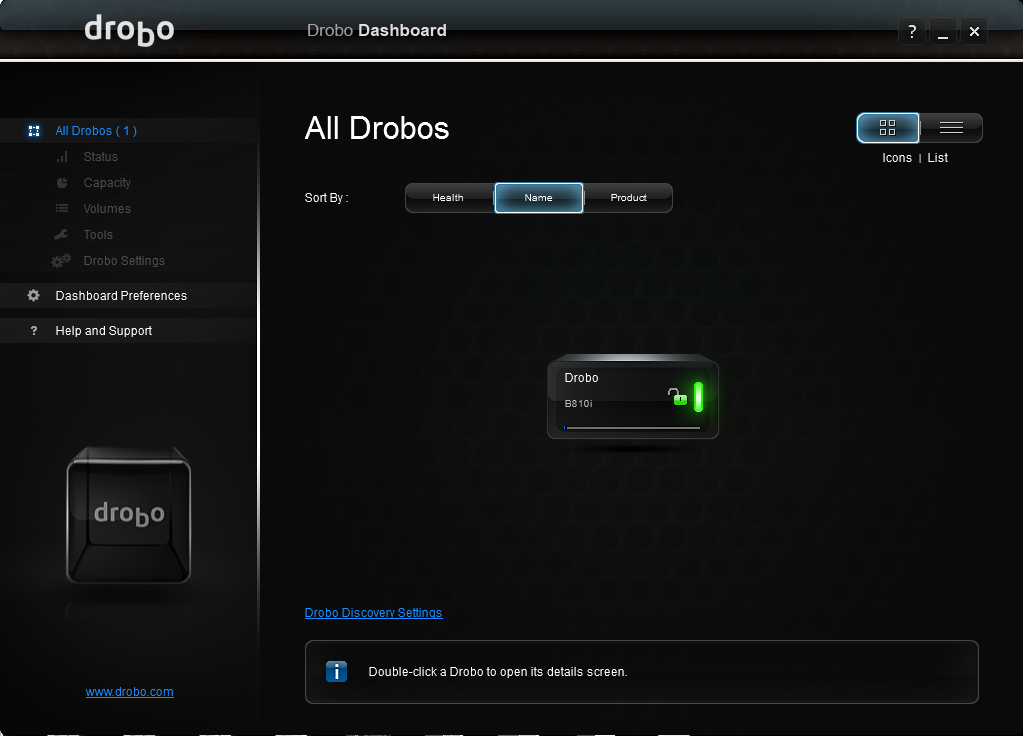
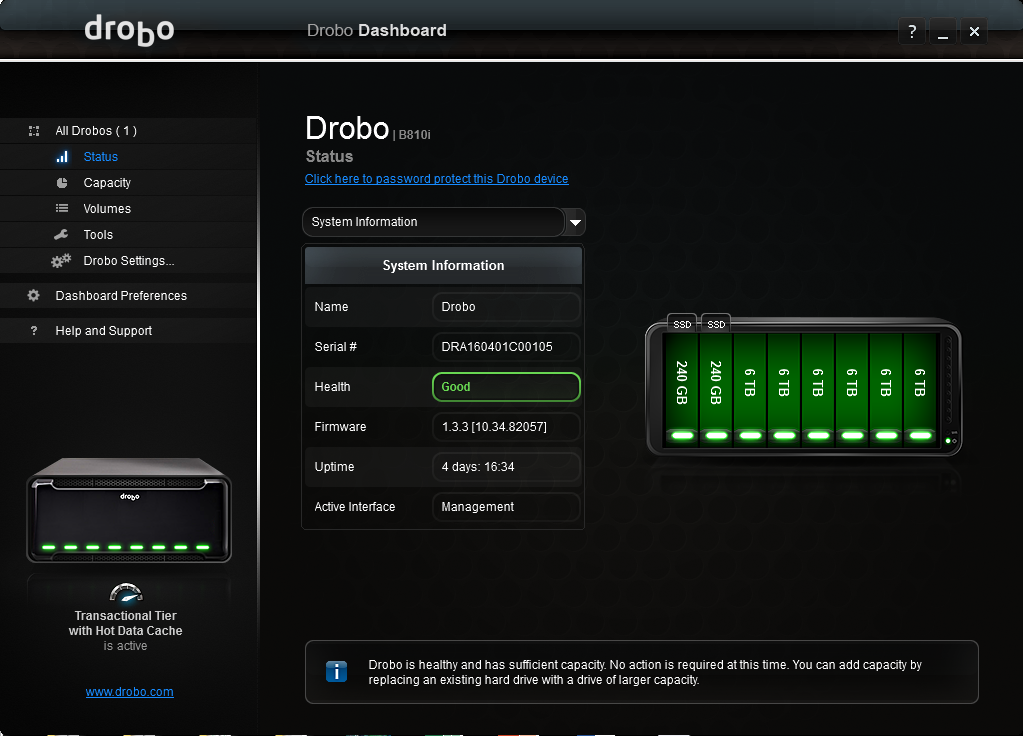
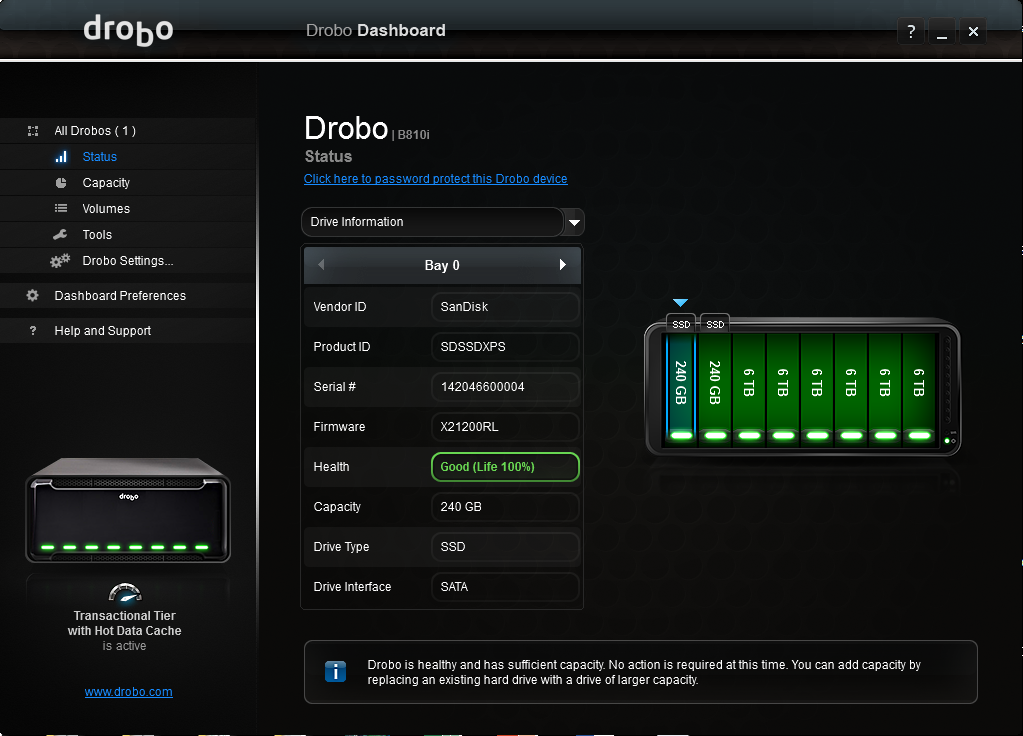
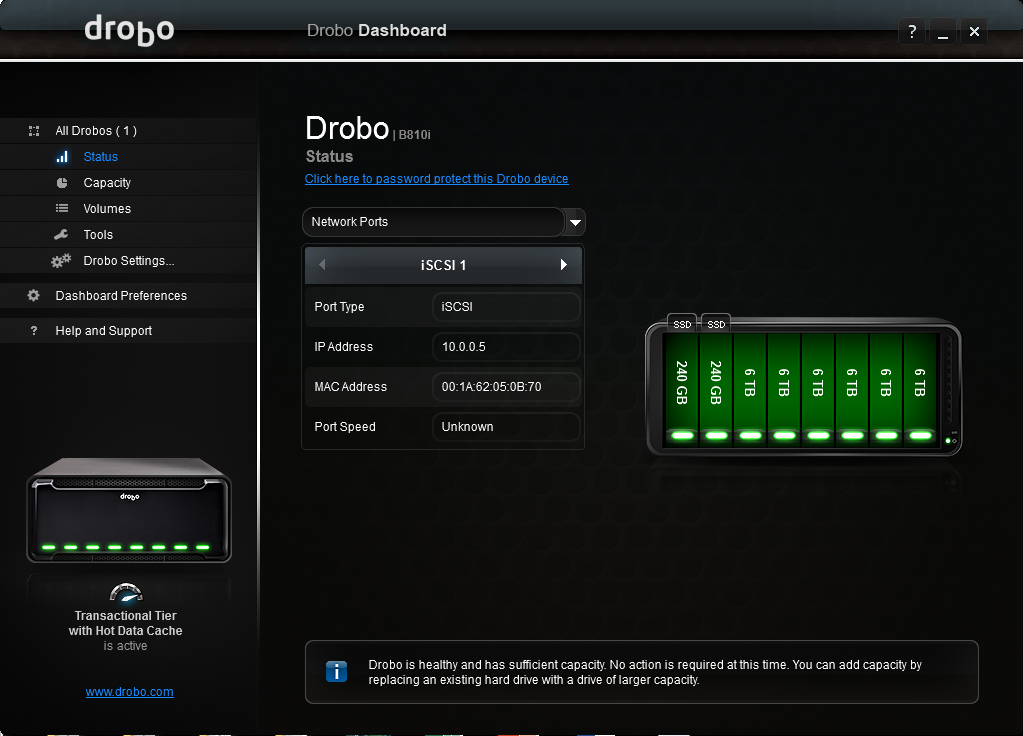
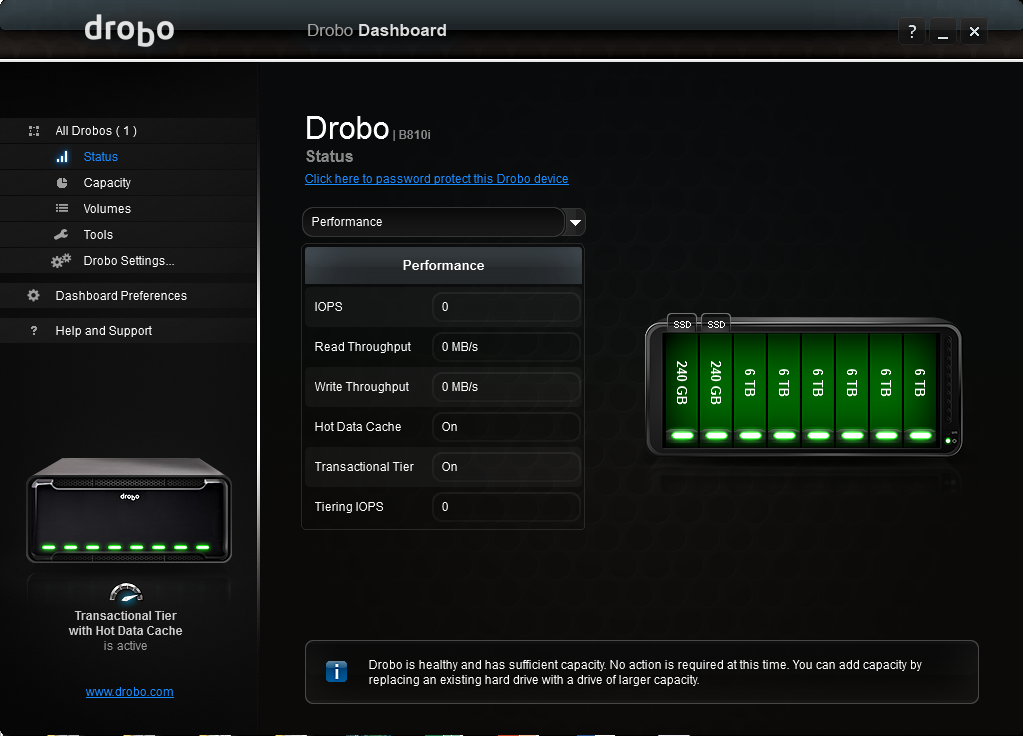
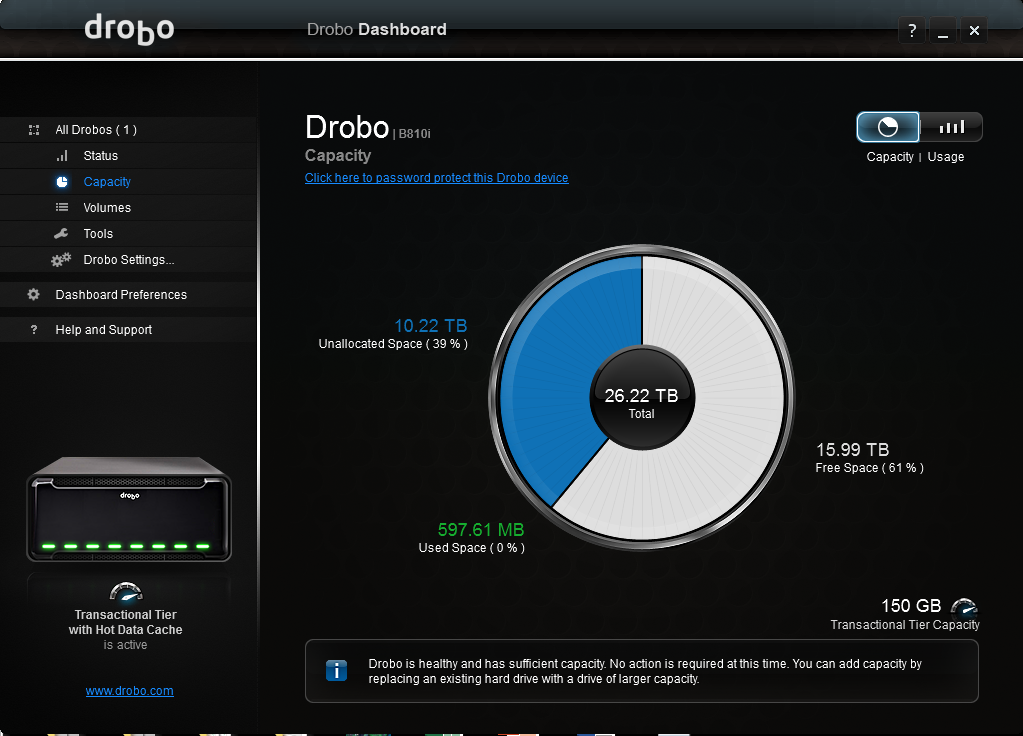
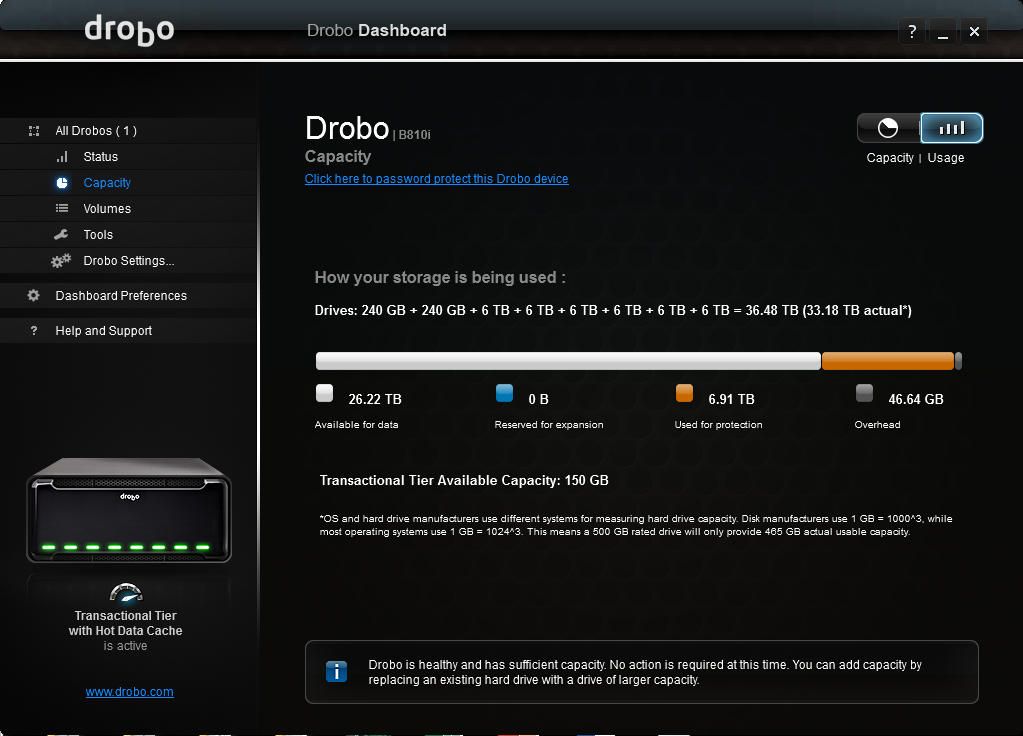
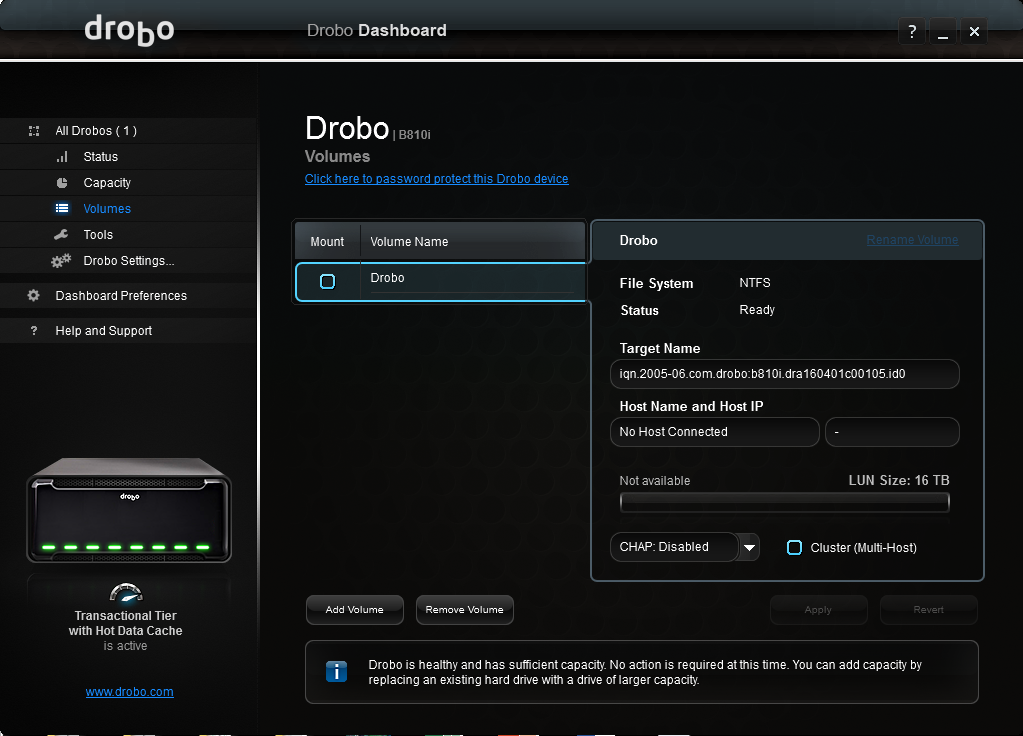
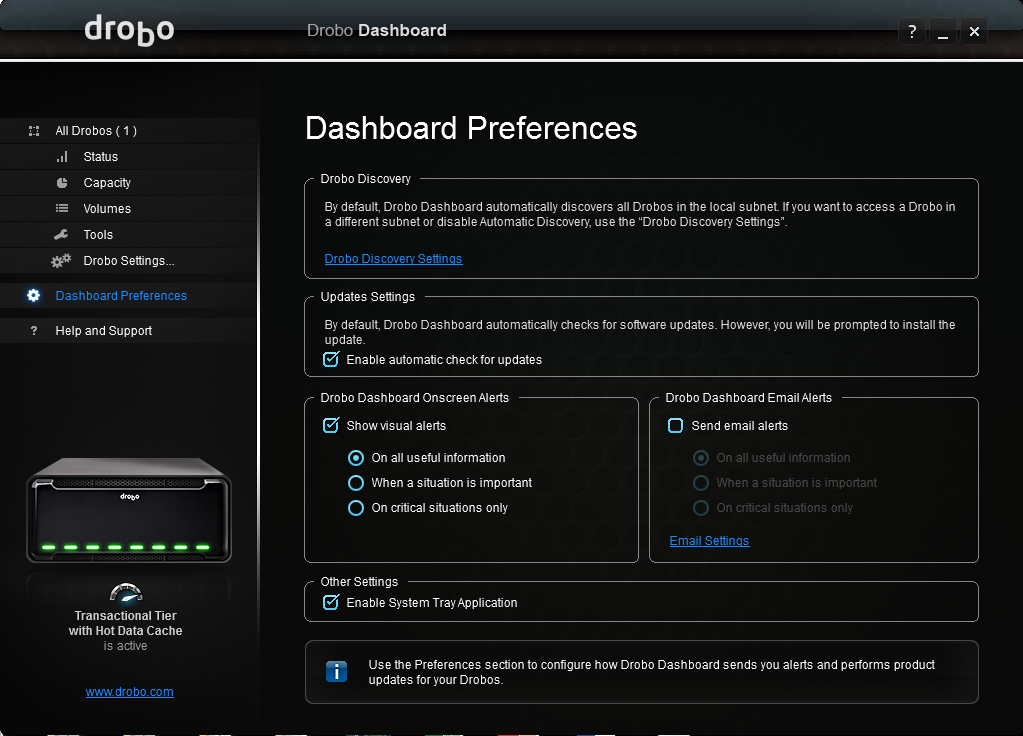
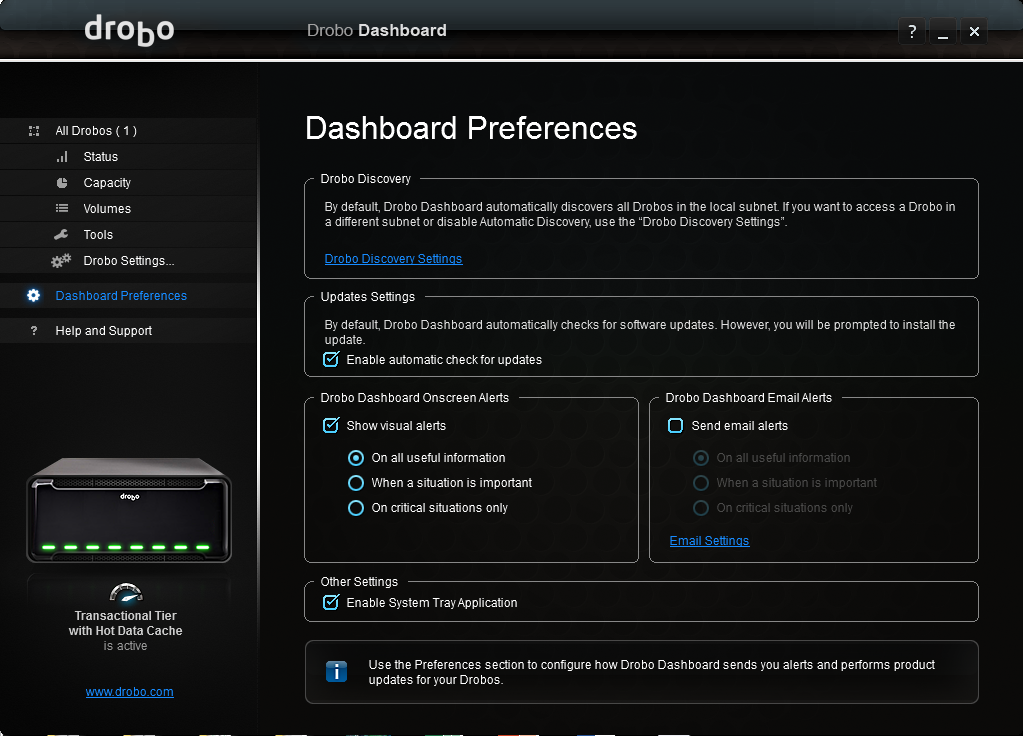
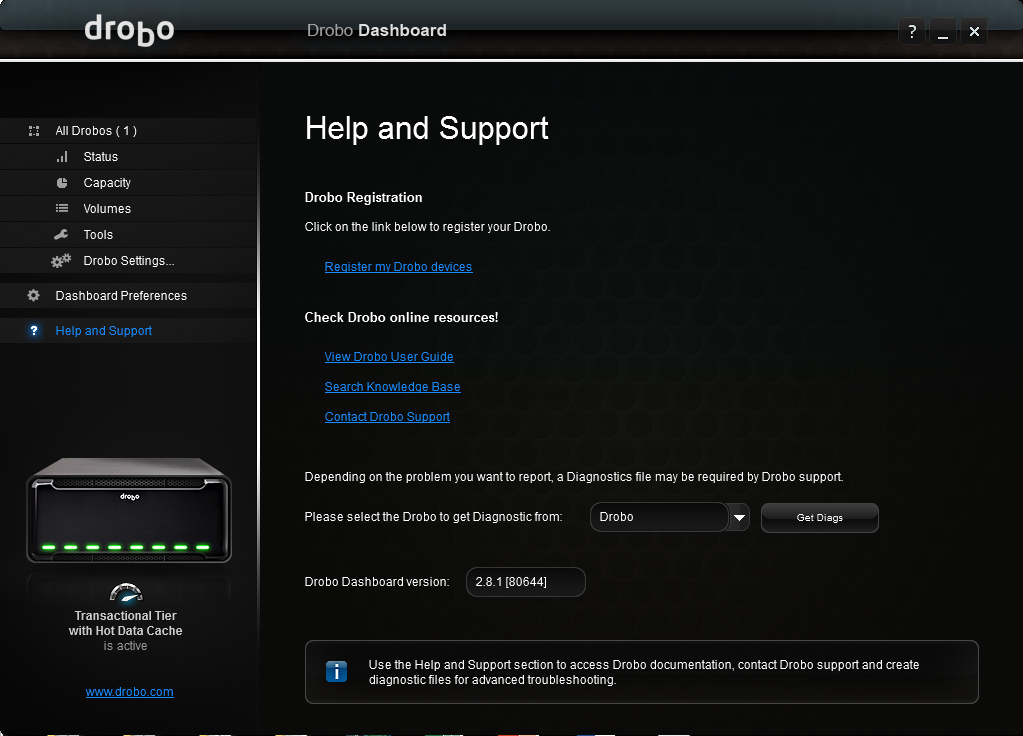
The "Zero-Click iSCSI Configuration" is much simpler than the Windows setup process. The downside is you need to run the Drobo application on each connected system. If your task is to configure a backup for each desktop in your office, you will find the process redundant and may prefer just to use the Windows setup process to reduce configuration time. The Drobo software has to scan the network, and that adds time to each configuration.
Still, the Drobo process is the easiest way we've found to configure iSCSI in Windows. When the system arrived, I'd never setup an iSCSI connection on a Mac. I couldn't even tell you where to start. A friend came over with a MacBook Pro, and I used the Drobo software to setup a connection and build a volume in less than five minutes. I felt like a Mac pro! That's the system's value proposition.
MORE: Best SSDs
MORE: How We Test HDDs And SSDs
MORE: All SSD Content
Get Tom's Hardware's best news and in-depth reviews, straight to your inbox.

Chris Ramseyer was a senior contributing editor for Tom's Hardware. He tested and reviewed consumer storage.
-
Vorador2 They seem to be branding the box as a iSCSI solution, which is not. Unless you don't mind the 7 mb/s speeds. Woefully underpowered for such a task.Reply
Any real use will see this box thrown out of the window, or demoted to a basic NAS box. -
derekullo Nothing beats the feeling of building your own san/nas the way you want it with FreeNas or Nas4FreeReply
ZFS for life!!! -
daglesj Reply20110245 said:Nothing beats the feeling of building your own san/nas the way you want it with FreeNas or Nas4Free
ZFS for life!!!
Thats fine for hobbyists or home users but sometimes you need something a little less homebrew. Especially in a work/small business environment. If a customer asks me to setup a file sharing and backup system then a off the shelf NAS from QNAP/Synology etc. is very very hard to beat. Setup and installed in 15 minutes and away I go. Time is money.
Also you choose a NAS because a lot of companies don't have full time IT depts or want to pay for over priced support contracts. The number of firms I've found with $10000 servers and $1000 a month support contracts when all they need is a $500 NAS is very high.
-
JamesSneed Reply20112093 said:20110245 said:Nothing beats the feeling of building your own san/nas the way you want it with FreeNas or Nas4Free
ZFS for life!!!
Thats fine for hobbyists or home users but sometimes you need something a little less homebrew. Especially in a work/small business environment. If a customer asks me to setup a file sharing and backup system then a off the shelf NAS from QNAP/Synology etc. is very very hard to beat. Setup and installed in 15 minutes and away I go. Time is money.
Also you choose a NAS because a lot of companies don't have full time IT depts or want to pay for over priced support contracts. The number of firms I've found with $10000 servers and $1000 a month support contracts when all they need is a $500 NAS is very high.
Those same companies overspending usually don't have competent IT folks and the most important thing for disk systems like a NAS is backups and recovery outside of the obvious performance and storage capacity. For a small company a proper off site backup that gets tested at least once a year to validate recovery is where I would put my extra money.
-
derekullo Reply20112414 said:20112093 said:20110245 said:Nothing beats the feeling of building your own san/nas the way you want it with FreeNas or Nas4Free
ZFS for life!!!
Thats fine for hobbyists or home users but sometimes you need something a little less homebrew. Especially in a work/small business environment. If a customer asks me to setup a file sharing and backup system then a off the shelf NAS from QNAP/Synology etc. is very very hard to beat. Setup and installed in 15 minutes and away I go. Time is money.
Also you choose a NAS because a lot of companies don't have full time IT depts or want to pay for over priced support contracts. The number of firms I've found with $10000 servers and $1000 a month support contracts when all they need is a $500 NAS is very high.
Those same companies overspending usually don't have competent IT folks and the most important thing for disk systems like a NAS is backups and recovery outside of the obvious performance and storage capacity. For a small company a proper off site backup that gets tested at least once a year to validate recovery is where I would put my extra money.
A fractal design define r5 has enough space for 8 hard drives.
Coupled with even a Core i3-6300T (supports ECC and lower power) and 32 gigabytes of ram it would run circl.... decahedrons around:
CPU
Marvell Quad-Core SoC (1.2 GHz Peak)
DRAM
2GB DDR3
"The system uses the same Marvell quad-core CPU and 2GB DRAM combination to power through complex workloads"
I almost though thought they were being sarcastic
For cheaper than the $884 they want for this drobo.
And it would allow you to run deduplication if you ever had the need.
You can say well not everyone needs that kind of power for their NAS.
And that may be true.
But if you are shopping for an 8 drive NAS/SAN then you are probably looking for something decently powerful.
I would imagine most small business would be fine with a 2, 3 or 4 bay NAS.
A 4 bay NAS for $230 is hard to beat even with a custom system and for a customer that is satisfied with that kind of speed and capacity it works well
But when you jump up to an 8 bay NAS and they want $884 without drives then I would start looking at a custom built NAS.
-
CRamseyer I think the Nytro 141 goes live this coming Saturday*.Reply
All dates and times are subject to change, lol. -
daglesj Reply20114131 said:20112414 said:20112093 said:20110245 said:Nothing beats the feeling of building your own san/nas the way you want it with FreeNas or Nas4Free
ZFS for life!!!
Thats fine for hobbyists or home users but sometimes you need something a little less homebrew. Especially in a work/small business environment. If a customer asks me to setup a file sharing and backup system then a off the shelf NAS from QNAP/Synology etc. is very very hard to beat. Setup and installed in 15 minutes and away I go. Time is money.
Also you choose a NAS because a lot of companies don't have full time IT depts or want to pay for over priced support contracts. The number of firms I've found with $10000 servers and $1000 a month support contracts when all they need is a $500 NAS is very high.
Those same companies overspending usually don't have competent IT folks and the most important thing for disk systems like a NAS is backups and recovery outside of the obvious performance and storage capacity. For a small company a proper off site backup that gets tested at least once a year to validate recovery is where I would put my extra money.
A fractal design define r5 has enough space for 8 hard drives.
Coupled with even a Core i3-6300T (supports ECC and lower power) and 32 gigabytes of ram it would run circl.... decahedrons around:
CPU
Marvell Quad-Core SoC (1.2 GHz Peak)
DRAM
2GB DDR3
"The system uses the same Marvell quad-core CPU and 2GB DRAM combination to power through complex workloads"
I almost though thought they were being sarcastic
For cheaper than the $884 they want for this drobo.
And it would allow you to run deduplication if you ever had the need.
You can say well not everyone needs that kind of power for their NAS.
And that may be true.
But if you are shopping for an 8 drive NAS/SAN then you are probably looking for something decently powerful.
I would imagine most small business would be fine with a 2, 3 or 4 bay NAS.
A 4 bay NAS for $230 is hard to beat even with a custom system and for a customer that is satisfied with that kind of speed and capacity it works well
But when you jump up to an 8 bay NAS and they want $884 without drives then I would start looking at a custom built NAS.
Most are fine with a 2 bay/dual ethernet in RAID1. Amazingly most small firms don't have more than around 100GB of data. These aren't media creation firms.
The problem with your solution is that for a firm to ask someone to put that all together is going to cost a lot extra in time and labour. But if they are happy to pay...go for it!
To be honest if they need that kind of 8bay+ data storage/system then I'd look at a proper supported data server
FreeNAS is fine for a hobbyist at home, great fun but not for business.